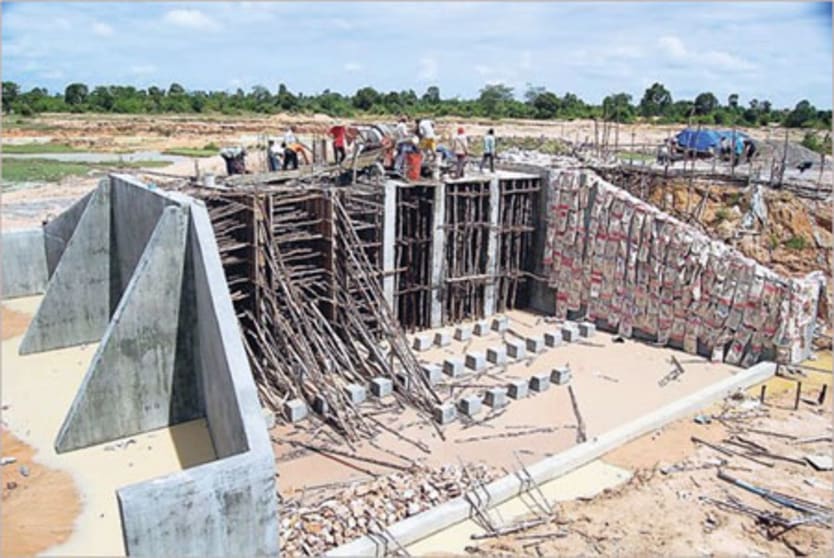
Whether in a big-named firm or a small consultancy, nurturing partnerships is key to landing engineering contracts and undertaking projects that truly suit a community’s needs.
Collaborations of senior engineers and local counterparts have become the emergent setup in implementing development projects of any scale. In most cases, experts from developed countries take the lead technical roles, while partners on the ground provide critical information about the community’s needs and local cultural peculiarities to consider.
British consulting engineer Garry Whitby saw the value of local experts’ involvement in a Malawi school project that started in 1995.
“Coming from a Western background, I didn’t want to say that I understood the community or how the community thinks,” Whitby said. “So, [it really helps to be] working with local professionals who may well have started their education learning under a tree.”
He said someone who had endured that situation “is much better able to work with you when you are designing schools and knows what it is the school needs to have.”
Local engineers tend to share that sentiment. Tanzanian engineer Halifa Msangi noted that local engineers like himself have a lot to learn from foreign partners.
“Working with international partners is good in getting contracts, getting experience,” the 20-year engineering veteran said. “You improve your quality because you get their best practices, you [gain] more experience, and you start getting international referees.”
International organizations that fund engineering projects often go for international contractors as “they don’t compromise in terms of quality,” Msangi noted.
“You can only get these projects by associating with international consulting engineers,” he said. “Of course, they encourage local consultants, but in terms of capacity, they require very high-level [ones].”
Local perspective, global impact
Seeking local collaborators has become part of business strategy for Whitby, who has worked as chief consultant for engineering projects of Western bilateral donors and the United Nations in sub-Saharan Africa and Asia.
“I’d have a partnership with firms, but we’ve also had to nurture a partnership with communities,” Whitby said. “It’s not only a commercial partnership, but also a social partnership. So, it’s like a social contract with them.”
Partnerships, he added, are essential as “you can’t go in and inflict an engineering project on a community without a community being involved.” They help ensure that projects are technically-sound and locally appropriate.
“It’s no good coming up with an engineering project in Afghanistan if you don’t actually consider the bombs going off, and safety, and how they’re gonna take materials in and out,” Whitby said.
He continued: “When building a road, you consider: Why are you building the road, and why are you building that road where it is, what are you trying to achieve?”
Whitby partners with established local firms with known experience in the kind of projects his firm handles.
Sustainability twice over
A project built on local-foreign partnerships may also be more sustainable, if local engineers develop the skills needed to take over a project at some point without much hand-holding from abroad, Whitby noted.
“I’ve found that working with local professionals, the architects and all the engineers, working with these people, we were able then to teach them project management skills,” he said. “The whole process that you’ve set up is then sustainable.”
Whitby’s firm would also enlist the help of villagers and provide them with basic construction, lending them skills that could be turned into a livelihood after a project had ended.
“We came up with a scheme of going around communities, we trained them in technical skills, so these illiterate [people] could do this basic work,” Whitby said. “When our project finished, they could go and take part in other projects in the community.”
He said the project goes beyond being an engineering venture and suggested its positive impact on the benefiting locality.
“It’s about what the project brings to that community, what are the social and economic benefits of it, and how can that be commercially sustainable,” Whitby said.
Involving locals also establishes a sense of ownership among project recipients, another crucial component in creating longevity.
“If you work within a community and get people from the community to help build it, it’s much more likely that they will look after it, much more likely that they’d benefit economically from it, and much more likely that it will be a viable project,” Whitby said.
Blending in
To promote such engagement, foreign engineers would do well to immerse themselves in the communities with which they serve. Whitby said he mixed with local communities and forwent living an expatriate life.
“I didn’t go to the golf club to meet people,” he remarked. “I’ve met people literally under a tree, sitting on a beer crate, drinking a beer.”
In all those encounters, he carried the mindset of a learner, listening rather than imposing his own knowledge and skills on locals.
“It is about mixing with them and getting to know them, building up a rapport and empathy with them, trying to understand their life, making them aware that I’m trying to understand their life,” he said.
For Whitby, it all goes back to remembering what all engineering is for.
He said: “Why else are we doing it? Why else are we building roads or hydroelectric plants? We’re doing it for the benefit of humans, of human development. And unless you understand dynamics of human development, of poverty, as an engineer, you can’t design anything.”
Read more engineering stories:
Engineering Jobs in International Development: What You Need You Know
International Engineering Jobs: Opportunities and Challenges
Read more career advice articles.
Search for articles
Most Read
- 1
- 2
- 3
- 4
- 5








